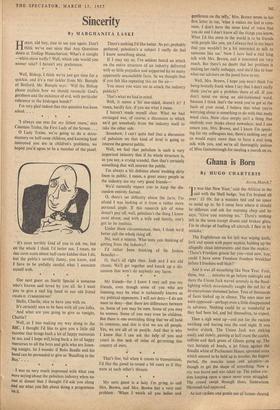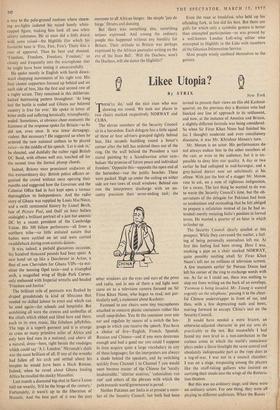Ghana is Born
By HUGO CHARTERIS Accra, March 7 41 T was like New Year,' said the African in the suit with the Shell badge, 'but I'm bruised all over : £3 10s. for a wooden bed and no space to stand up in. So I come here where it should be different and ask for morning chop and he says, "Give you morning tea." There's nothing left in the town except drums and broken glass. I'm in charge of fuelling all aircraft. I flew in by mistake.'
The Englishman on his left was wiping knife, fork and spoon with paper napkin, holding up the allegedly clean instruments and then the napkin : `There's Freedom grease for you—and now, boy, could I have some Freedom freedom breakfast before I freedom well blub?'
And it was all something like New Year. Four, three, two .. . minutes to go before midnight and there the Union Jack waved serenely in the flood- lighting which occasionally caught the red fez of its executioner stationedbelow. Tens of thousands of faces looked up in silence. The ones near me were appeased—perhaps even a little disappointed in advance. Nothing could be as wonderful as they had been led, and led themselves, to expect.
Then a sigh went up—and not for the rockets swishing and tearing into the cool night. It was twelve o'clock. The Union Jack was sinking easily and slowly, passing at half-mast the scarlet, saffron and dark green of Ghana going up. The vast horizon of heads, a jet frieze against the floodlit white of Parliament House, sprouted arms which seemed to be held up in wonder, the fingers parted, the muscles loose and adaptive—as though to get the shape of something. Now a cry was heard and was taken up. The police cor- don keeping open a space never even struggled. The crowd swept through them. Somewhere Nkrurnah had appeared.
At last cyclists and gentle use of batons cleared a way to the polo-ground rostrum where steam- ing arc-lights isolated his raised lonely white- capped figure, making him look all one white silvery substance. He at once did a little dance with arms raised—the Highlife (for which his favourite tune is 'Fire, Fire, Fire'). There was a roar of approval. Then he bent and shouted, 'Freedom, Freedom, Freedom, Freedom,' so closely and frequently into the microphone that he might have been testing it unsuccessfully.
He spoke mostly in English with harsh down- ward chopping movements of his right arm. His four closest supporters formed up behind and on each side of him, like the first and second row of a rugby scrum. They remained in this deliberate, locked buttressing pattern throughout. 'At long last the battle is ended and Ghana our beloved country is free for ever.' He spoke in terms of bitter strife and suffering heroically, triumphantly, ended. Sometimes, at obvious cheer-moments the faintness of the response spoke for Britain—as he did not, even once. It was tense demagogy, violent. But necessary? He suggested so when he ordered the new national anthem to be played twice—in the middle of his speech. 'Let it sink in,' he shouted, and dutifully the rather rigid British OC Band, with elbows well out, touched off for the second time the formal plump chords.
Indeed, Britons were prominent midwives of this extraordinary day. British police officers or- ganised the crowd without once opening their mouths and suggested how the Governor and the Colonial Office had in fact kept open a tarmac thoroughfare to Independence. And the radio story of Ghana was supplied by Louis MacNiece, and a swift ceremonial history by Lionel Birch, late of Picture Post, and (half an hour before midnight) a brilliant portrait of a just but anxmic DC by a recent president of the Cambridge Union. His 300 fellow performers—all from a northern tribe—so little imitated nature that babies were suckled on set and were carried swaddleback during even ecstatic dances.
It was, indeed, a piebald glamorous occasion. Six hundred thousand pounds had been spent. A new hotel set up like a Dorchester in Acton, a fleet of new Chevrolets for Ghana VIPs—to out- shine the teeming Opel taxis—and a triumphal arch, a magnified wing of Hyde Park Corner, only embossed with Imperial wreaths and headed 'Freedom and Justice.'
The brilliant mile of pennants was flanked by draped grandstands (a kind of Meccano that needed no skilled labour to erect and which can be used again—for schools and hospitals). But outshining all were the crowns and umbrellas of the chiefs which ebbed and lilted here and there, each to its own music, like fabulous jellyfishes. The toga is a superb garment and it is strange to cross so many primitive miles of Africa and only here find men in a national, and above all a natural, dress—here, right beside the roadsigns which could say 'Ai. London.' Nkrumah's cloth was the most brilliant of all. If one of the wreaths had fallen off his arch and settled about his temples he would have been a black Roman. Indeed, when he raved about Ghana leading Africa he recalled the stocky Mussolini.
Last month a diamond big-shot in Sierra Leone told me wearily, 'It'll be the binge of the century.' Fortunately, it wasn't up to the liberation of Brussels. And the best part of it was the part common to all African binges : the simple 'joie de binge.' Drums and dancing.
But there was something else, something serious expressed. And among the ordinary - people this happened without any hostility for Britain. Their attitude to Britain was perhaps expressed by the African journalist writing on the eve of the State Ball : Will the Duchess, won't the Duchess, will she dance the Highlife?' Even the man at breakfast, who held up his offending fork, at last did his best. But there are gulfs for which only a symbolic gesture is better than attempted participation—as was proved by a well-known London Left-wing editor who attempted to Highlife in the Lido with members of the Ghanian Information Service.
Most people wisely confined themselves to the gesture.



































 Previous page
Previous page